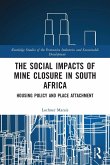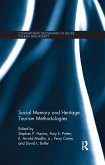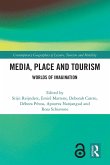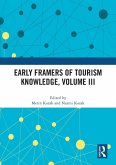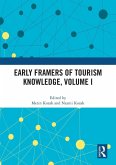Theoretical Advancement in Social Impacts Assessment of Tourism Research
Herausgeber: Woosnam, Kyle Maurice; Ribeiro, Manuel Alector
Theoretical Advancement in Social Impacts Assessment of Tourism Research
Herausgeber: Woosnam, Kyle Maurice; Ribeiro, Manuel Alector
- Broschiertes Buch
- Merkliste
- Auf die Merkliste
- Bewerten Bewerten
- Teilen
- Produkt teilen
- Produkterinnerung
- Produkterinnerung
This book provides the reader with a fresh perspective of the use of theory in the body of research centred on social impacts of tourism. It will be of great interest to all upper-level students and researchers in tourism, planning and related fields.
Andere Kunden interessierten sich auch für
![The Social Impacts of Mine Closure in South Africa The Social Impacts of Mine Closure in South Africa]() Lochner MaraisThe Social Impacts of Mine Closure in South Africa55,99 €
Lochner MaraisThe Social Impacts of Mine Closure in South Africa55,99 €![Routledge Handbook of Social Psychology of Tourism Routledge Handbook of Social Psychology of Tourism]() Routledge Handbook of Social Psychology of Tourism58,99 €
Routledge Handbook of Social Psychology of Tourism58,99 €![Social Memory and Heritage Tourism Methodologies Social Memory and Heritage Tourism Methodologies]() Social Memory and Heritage Tourism Methodologies64,99 €
Social Memory and Heritage Tourism Methodologies64,99 €![Migration, Tourism and Social Sustainability Migration, Tourism and Social Sustainability]() Migration, Tourism and Social Sustainability54,99 €
Migration, Tourism and Social Sustainability54,99 €![Media, Place and Tourism Media, Place and Tourism]() Media, Place and Tourism57,99 €
Media, Place and Tourism57,99 €![Early Framers of Tourism Knowledge, Volume III Early Framers of Tourism Knowledge, Volume III]() Early Framers of Tourism Knowledge, Volume III55,99 €
Early Framers of Tourism Knowledge, Volume III55,99 €![Early Framers of Tourism Knowledge, Volume I Early Framers of Tourism Knowledge, Volume I]() Early Framers of Tourism Knowledge, Volume I55,99 €
Early Framers of Tourism Knowledge, Volume I55,99 €-
-
-
This book provides the reader with a fresh perspective of the use of theory in the body of research centred on social impacts of tourism. It will be of great interest to all upper-level students and researchers in tourism, planning and related fields.
Produktdetails
- Produktdetails
- Verlag: Routledge
- Seitenzahl: 282
- Erscheinungstermin: 6. Mai 2025
- Englisch
- Abmessung: 246mm x 174mm x 15mm
- Gewicht: 507g
- ISBN-13: 9781032536996
- ISBN-10: 1032536993
- Artikelnr.: 73936121
- Herstellerkennzeichnung
- Libri GmbH
- Europaallee 1
- 36244 Bad Hersfeld
- gpsr@libri.de
- Verlag: Routledge
- Seitenzahl: 282
- Erscheinungstermin: 6. Mai 2025
- Englisch
- Abmessung: 246mm x 174mm x 15mm
- Gewicht: 507g
- ISBN-13: 9781032536996
- ISBN-10: 1032536993
- Artikelnr.: 73936121
- Herstellerkennzeichnung
- Libri GmbH
- Europaallee 1
- 36244 Bad Hersfeld
- gpsr@libri.de
Kyle Maurice Woosnam is Professor of Parks, Recreation and Tourism Management at the Warnell School of Forestry & Natural Resources, University of Georgia, USA. He is also Senior Research Fellow at the School of Tourism and Hospitality Management, University of Johannesburg, South Africa. Manuel Alector Ribeiro is a Senior Lecturer in Tourism Management at the School of Hospitality and Tourism Management, University of Sussex, UK. He is also Senior Research Fellow at the School of Tourism and Hospitality Management, University of Johannesburg, South Africa; and an integrated member of the Research Centre for Tourism, Sustainability and Well-being (Cinturs) at the Faculty of Economics, University of Algarve, Portugal.
Introduction - Advancing theory within social impacts of tourism research
1. Towards a better tourist-host relationship: the role of social contact
between tourists' perceived cultural distance and travel attitude
2.Complementing theories to explain emotional solidarity 3. The importance
of collaboration and emotional solidarity in residents' support for
sustainable urban tourism: case study Ho Chi Minh City 4. Hapless victims
or empowered citizens? Understanding residents' attitudes towards Airbnb
using Weber's Theory of Rationality and Foucauldian concepts 5. Empowerment
of women through cultural tourism: perspectives of Hui minority
embroiderers in Ningxia, China 6. Effects of social media on residents'
attitudes to tourism: conceptual framework and research propositions 7.
Re-theorizing social emotions in tourism: applying the theory of
interaction ritual in tourism research 8. Understanding the
tourist-resident relationship through social contact: progressing the
development of social contact in tourism 9. It's time to act! Understanding
online resistance against tourism development projects 10. Conceptualizing
peer-to-peer accommodations as disruptions in the urban tourism system 11.
Support for tourism: the roles of attitudes, subjective wellbeing, and
emotional solidarity 12. Indigenous residents, tourism knowledge exchange
and situated perceptions of tourism 13. Exploring how perceived tourism
impacts evolve over time (2009-2019) in an era of uncertainty: economic
crisis, host-guest interactions, and Airbnb
1. Towards a better tourist-host relationship: the role of social contact
between tourists' perceived cultural distance and travel attitude
2.Complementing theories to explain emotional solidarity 3. The importance
of collaboration and emotional solidarity in residents' support for
sustainable urban tourism: case study Ho Chi Minh City 4. Hapless victims
or empowered citizens? Understanding residents' attitudes towards Airbnb
using Weber's Theory of Rationality and Foucauldian concepts 5. Empowerment
of women through cultural tourism: perspectives of Hui minority
embroiderers in Ningxia, China 6. Effects of social media on residents'
attitudes to tourism: conceptual framework and research propositions 7.
Re-theorizing social emotions in tourism: applying the theory of
interaction ritual in tourism research 8. Understanding the
tourist-resident relationship through social contact: progressing the
development of social contact in tourism 9. It's time to act! Understanding
online resistance against tourism development projects 10. Conceptualizing
peer-to-peer accommodations as disruptions in the urban tourism system 11.
Support for tourism: the roles of attitudes, subjective wellbeing, and
emotional solidarity 12. Indigenous residents, tourism knowledge exchange
and situated perceptions of tourism 13. Exploring how perceived tourism
impacts evolve over time (2009-2019) in an era of uncertainty: economic
crisis, host-guest interactions, and Airbnb
Introduction - Advancing theory within social impacts of tourism research
1. Towards a better tourist-host relationship: the role of social contact
between tourists' perceived cultural distance and travel attitude
2.Complementing theories to explain emotional solidarity 3. The importance
of collaboration and emotional solidarity in residents' support for
sustainable urban tourism: case study Ho Chi Minh City 4. Hapless victims
or empowered citizens? Understanding residents' attitudes towards Airbnb
using Weber's Theory of Rationality and Foucauldian concepts 5. Empowerment
of women through cultural tourism: perspectives of Hui minority
embroiderers in Ningxia, China 6. Effects of social media on residents'
attitudes to tourism: conceptual framework and research propositions 7.
Re-theorizing social emotions in tourism: applying the theory of
interaction ritual in tourism research 8. Understanding the
tourist-resident relationship through social contact: progressing the
development of social contact in tourism 9. It's time to act! Understanding
online resistance against tourism development projects 10. Conceptualizing
peer-to-peer accommodations as disruptions in the urban tourism system 11.
Support for tourism: the roles of attitudes, subjective wellbeing, and
emotional solidarity 12. Indigenous residents, tourism knowledge exchange
and situated perceptions of tourism 13. Exploring how perceived tourism
impacts evolve over time (2009-2019) in an era of uncertainty: economic
crisis, host-guest interactions, and Airbnb
1. Towards a better tourist-host relationship: the role of social contact
between tourists' perceived cultural distance and travel attitude
2.Complementing theories to explain emotional solidarity 3. The importance
of collaboration and emotional solidarity in residents' support for
sustainable urban tourism: case study Ho Chi Minh City 4. Hapless victims
or empowered citizens? Understanding residents' attitudes towards Airbnb
using Weber's Theory of Rationality and Foucauldian concepts 5. Empowerment
of women through cultural tourism: perspectives of Hui minority
embroiderers in Ningxia, China 6. Effects of social media on residents'
attitudes to tourism: conceptual framework and research propositions 7.
Re-theorizing social emotions in tourism: applying the theory of
interaction ritual in tourism research 8. Understanding the
tourist-resident relationship through social contact: progressing the
development of social contact in tourism 9. It's time to act! Understanding
online resistance against tourism development projects 10. Conceptualizing
peer-to-peer accommodations as disruptions in the urban tourism system 11.
Support for tourism: the roles of attitudes, subjective wellbeing, and
emotional solidarity 12. Indigenous residents, tourism knowledge exchange
and situated perceptions of tourism 13. Exploring how perceived tourism
impacts evolve over time (2009-2019) in an era of uncertainty: economic
crisis, host-guest interactions, and Airbnb



